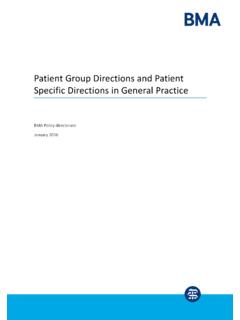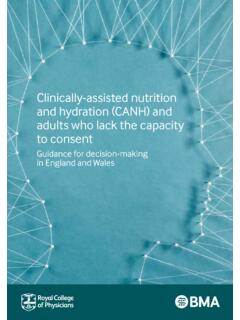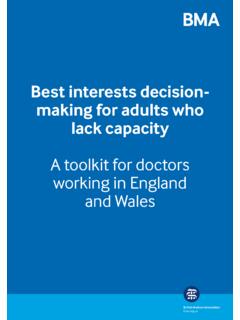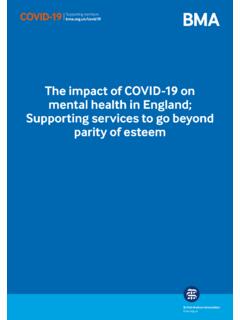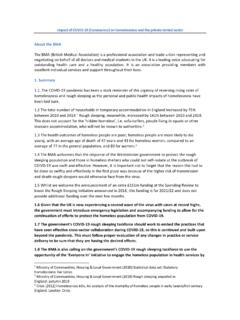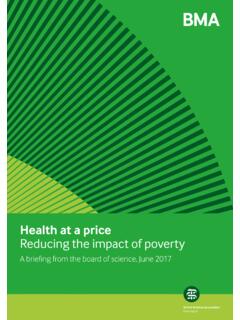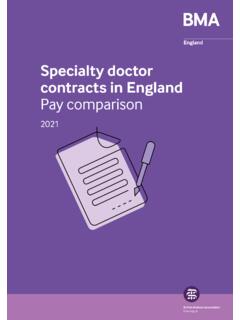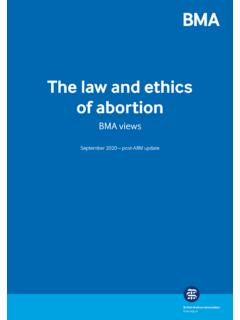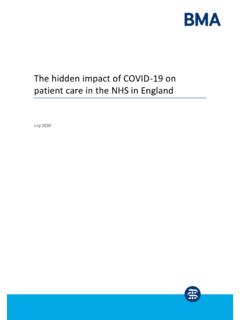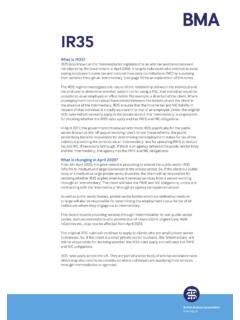Transcription of Ethics Department - BMA
1 Ethics Department Parental responsibility Guidance from the British Medical Association What is parental responsibility? Who possesses parental responsibility? Consent from people with parental responsibility What are the limits to parental responsibility? What happens when people with parental responsibility disagree? Some common questions relating to parental responsibility Can a parent who does not live with a child gain access to the child s medical record? Can a relative other than a parent give consent to medical treatment on behalf of a child? Parental responsibility and Human Rights Competent children and the limits to parental responsibility October 2008 Parental responsibility 2006 1 Basic principles Parental responsibility refers to the rights, duties, powers and responsibilities that most parents have in respect of their children.
2 Parental responsibility includes the right of parents to consent to treatment on behalf of their children, provided the treatment is in the interests of the child. Those with parental responsibility have a statutory right to apply for access to their children s health records, although if the child is capable of giving consent, he or she must consent to the access Competent children can decide many aspects of their care for themselves. Where doctors believe that parental decisions are not in the best interests of the child, it may be necessary to seek a view from the courts, whilst meanwhile only providing emergency treatment that is essential to preserve life or prevent serious deterioration. Terminology In this guidance note, the legal scope and limits of parental responsibility are set out.
3 Clearly the concept of parental responsibility has particular importance in relation to young and very young children since competent minors have a right to be consulted and to decide many aspects of their care for themselves. What is parental responsibility? Parental responsibility is a legal concept that consists of the rights, duties, powers, responsibilities and authority that most parents have in respect of their children. It includes the right to give consent to medical treatment, although as is discussed below, this right is not absolute, as well as, in certain circumstances, the freedom to delegate some decision-making responsibility to others. In addition, competent children can consent to diagnosis and treatment on their own behalf if they understand the implications of what is proposed (see below).
4 Those with parental responsibility also have a statutory right to apply for access to the health records of their child, although children who are mature enough to express views on the issue also need to be asked before parents see their record. Parental responsibility is afforded not only to parents, however, and not all parents have parental responsibility, despite arguably having equal moral rights to make decisions for their children where they have been equally involved in their care. Who possesses parental responsibility? The law in relation to parental responsibility has recently been revised. For a child whose birth was registered from 15th April 2002 in Northern Ireland, 1st December 2003 in England and Wales and 4th May 2006 in Scotland, both of the child's parents have parental responsibility if they are registered on the child's birth certificate.
5 Throughout the United Kingdom, a mother automatically acquires parental responsibility at birth. However, the acquisition of parental responsibility by a father varies according to where and when the child's birth was registered: For births registered in England, Wales or Northern Ireland A father acquires parental responsibility if he is married to the mother at the time of the child's birth or subsequently. An unmarried father will acquire parental responsibility if he is recorded on the child's birth certificate (at registration or upon re-registration) from 1st December 2003 in England or Wales and from 15th April 2002 in Northern Ireland. For births registered in Scotland A father acquires parental responsibility if he is married to the mother at the time of the child's conception or subsequently.
6 An unmarried father will acquire parental responsibility if he is recorded on the child's birth certificate (at registration or upon re-registration) from 4th May 2006. For births registered outside the United Kingdom The above rules for the UK country where the child resides apply. An unmarried father, whose child's birth was registered before the dates mentioned above, or afterwards if he is not recorded on the child's birth certificate, does not have parental responsibility even if he has lived with the mother for a long time. However, the father can acquire parental responsibility by way of a court registered parental responsibility agreement with the mother or by obtaining a parental responsibility order or a residence order from the courts.
7 Married step-parents and registered civil partners can acquire parental responsibility in the same ways. Parental responsibility awarded by a court can only be removed by a court. Parents do not lose parental responsibility if they divorce neither can a separated or divorced parent relinquish parental responsibility. This is true even if the parent without custody does not have contact with the child and does not make any financial contribution. Other people can also acquire parental responsibility for a child. A testamentary guardian will acquire parental responsibility if no one with parental responsibility survives the testator. A guardian appointed by a court will also acquire parental responsibility. When a child is adopted, the adoptive parents are the child's legal parents and automatically acquire parental responsibility.
8 A local authority acquires parental responsibility (shared with anyone else with parental responsibility) while the child is subject to a care or supervision order. Foster parents rarely Parental responsibility 2006 have parental responsibility. For a child born under a surrogacy arrangement, parental responsibility will lie with the surrogate mother (and husband if married) until the intended parents either (a) obtain a parental order from a court under the Human Fertilisation and Embryology Act 1990 or (b) adopt the child. In England, Wales and Northern Ireland, parental responsibilities may be exercised until a young person reaches 18 years. In Scotland, only the aspect of parental responsibilities concerned with the giving of guidance 1 endures until 18 years, guidance meaning the provision of advice.
9 The rest is lost when the young person reaches 16 years. Consent from people with parental responsibility People with parental responsibilities are entitled to give consent for medical treatment on behalf of their children. Usually parents desire to make the right decision about their young child s best interests, and most decision making is, rightly, left to children and parents with appropriate input from the clinical team. In cases of serious or chronic illness, parents may need time, respite facilities, possibly counselling, and certainly support from health professionals, but in most cases they are best placed to judge their young child s interests and decide about serious treatment. There are limits on what parents are entitled to decide, however, and they are not entitled to inappropriate treatment for their children or to refuse treatment which is in the child s best interests.
10 For example, where children need blood products to prevent death or serious deterioration, a refusal by a parent who is a Jehovah s Witness is unlikely to be binding on doctors. What are the limits to parental responsibility? The moral authority behind parental responsibility depends in large part on the entirely reasonable supposition that parents will act in the best interests of their children. If it appears, however, that parents are following a course of action which is contrary to their child s interests, their decisions can be challenged. Where doctors believe that parental decisions are not in the best interests of the child, it may be necessary to seek a view from the courts, whilst meanwhile providing only emergency treatment that is essential to preserve life or prevent serious deterioration.
